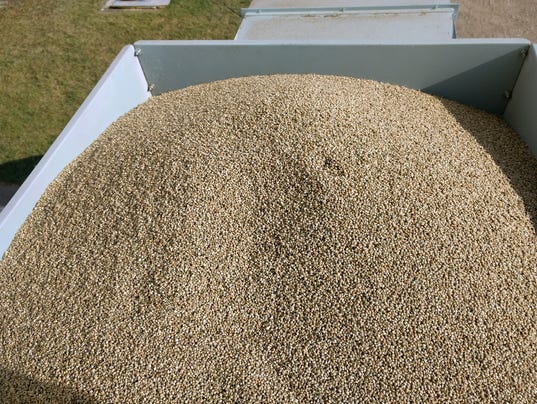Source: wisfarmer.com

Industrial hemp seeds
If you believe the enthusiasts, industrial hemp could be the comeback story of our time - if only given a chance.
Potential uses abound for the plant, a primary cash crop as clothing, oil and rope from the time of Pennsylvania’s founding in 1681 to the mid-19th century but a casualty of the war on the cannabis plant. Among the new uses for the plant are beauty products, car parts, building materials and housing insulation, energy storage devices for electronics, pest resistance and weed suppression.
It does not get you high.
Now, as legal and cultural barriers begin to fall, advocates are confronting perhaps the most difficult hurdle: developing from scratch the institutions and supply chain to sustain a stable market.
Thanks to an expansion of a state-run hemp pilot program, Lehigh University, Thomas Jefferson University and the nonprofit Pennsylvania Hemp Industry Council are exploring a partnership aimed at becoming a locus for the nascent U.S. industry.
The research alliance — yet to be formalized, both universities emphasized — would seek a federal “center of excellence” designation, giving it first dibs on U.S. Department of Agriculture funding. It also seeks relationships with international companies that own the harvesting equipment and processing technology to develop a viable market.
It could deliver an economic boon for the Lehigh Valley and Southeastern Pennsylvania. Geoff Whaling, president of the Pennsylvania Hemp Industry Council, led a coalition last month to Europe, where it made a pitch to HempFlax, a Netherlands-based processing company with an eye on the U.S. market.
The company appreciated the holistic approach Lehigh and its partners are taking, said Cameron McCoy, Lehigh’s assistant vice president of economic engagement. Rather than merely selling equipment, HempFlax could gain from the alliance’s research and its relationship with existing manufacturers.
Whaling said the company needs at least 3,000 acres of hemp to make an investment worthwhile. He hopes to get commitments from regional farmers by the Jan. 19 deadline for the state pilot program to show that the alliance is more than talk.
Industrial hemp and marijuana come from the same fibrous cannabis plant, but hemp has a negligible amount of THC, the psychoactive substance that gets you high.
The market has grown despite legal constraints. Imports of hemp, seeds, and fibers were nearly $78.2 million in 2015, up from $5.6 million in 2005, according to industry estimates. Those imports contributed to U.S. retail sales of hemp products of nearly $600 million in 2015.
To understand the possible future of industrial hemp, consider the petroleum refinery, said Ronald Kander, dean of Jefferson’s Kanbar College of Design, Engineering and Commerce.
Refineries don’t process crude oil for a single use, such as gasoline; that wouldn’t be economically viable. Instead, crude oil is converted into many products. And investors need to calculate the time and resources to make a given product and the value it will create.
Likewise, before farmers commit to hemp farming, they need to know they can make money. That requires buyers.
Researchers must decide which applications make the most sense to develop, Kander said.
There are four key questions: Does the hemp-derived product outperform what’s currently used? Is it less expensive to produce? Is it more environmentally sustainable? Will the consumer look past hemp’s relationship to marijuana? Kander thinks you probably need two affirmative answers to make development worthwhile.
Jefferson launched the Lambert Center for the Study of Medicinal Cannabis and Hemp last year with to a donation from an Australian banker, who also brought the industrial hemp company Ecofibre to Kentucky. Jefferson considers its expertise in medicine and applied research harmonious with Lehigh’s engineering strengths. Both have supply-chain management programs.
State and federal restrictions still must change before the industry can thrive.
After the 2014 farm bill, the federal government has permitted growing hemp for research, and farmers can cultivate industrial hemp for commercial purposes in at least 20 states, according to the National Conference of State Legislatures.
Legal barriers remain. The federal Controlled Substances Act still classifies hemp under its definition of marijuana as a drug with no accepted medical use and a high potential for abuse. This complicates interstate commerce and blocks access to financial services.
But a bill in the U.S. House would exempt hemp from the act.
No comments:
Post a Comment